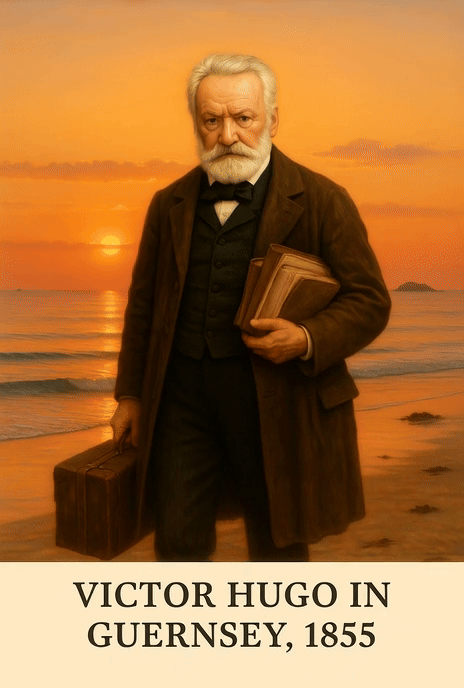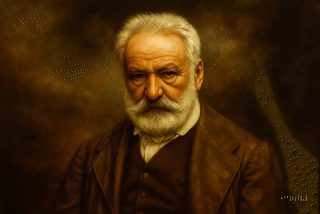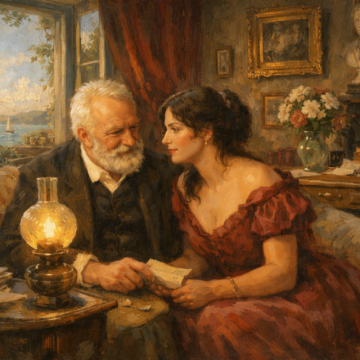Victor Hugo and the Birth of Les Misérables in Guernsey
When the great French writer Victor Hugo arrived in Guernsey in 1855, he was a man cast out of his homeland. Exiled by Emperor Napoleon III for daring to speak truth to power, Hugo stepped ashore in St. Peter Port carrying manuscripts, notebooks, and a restless imagination.
He did not yet know it, but this small Channel Island — a quiet, wind-shaped place of cliffs and calm — would become the setting for one of the most creative periods of his entire life. It was here, among the cobbled streets and sea air, that he completed one of the greatest novels ever written: Les Misérables.
From Paris to Exile
Hugo began Les Misérables in 1845, at the height of his fame in Paris. He had long dreamed of writing a vast moral novel about justice, poverty, and redemption — a book that could hold a mirror up to society.
Then came the political chaos of 1848. Hugo entered public life, fought for democracy, and ultimately opposed the coup that made Louis-Napoléon Bonaparte Emperor. For that defiance, he was forced to flee France.
He lived first in Belgium, then Jersey, and finally — after being expelled for defending other exiles — he sailed across to Guernsey, where he would spend the next 15 years.

Hauteville House: The House of Exile
Hugo bought a tall house on Hauteville in St. Peter Port in 1856, using the proceeds from his poetry collection Les Contemplations.
He transformed it into something extraordinary — part Gothic mansion, part work of art. Every room told a story: carved wood panels, mirrored ceilings, Chinese lacquer, red velvet, and at the very top, a glass lookout facing east toward France.
In that bright attic room, standing before a small desk, Hugo found the clarity he needed to finish the great work he had begun a decade earlier.
Guernsey: The Island That Freed His Mind
Guernsey gave Hugo something he hadn’t known for years — silence, distance, and freedom.
He would rise at dawn, swim in the cold sea at Havelet Bay, and then climb to his writing room overlooking Castle Cornet. There, surrounded by the light of the Channel, he worked for hours — rewriting, refining, and expanding Les Misérables into a universal story of suffering, hope, and forgiveness.
He later said:
“I am working under the eye of my enemy. France is there — but so is liberty.”
From exile, he found his voice again.
Finishing Les Misérables
By 1861, the manuscript was complete — nearly 1,500 pages long.
The book was proofread from Guernsey and published in Paris in 1862.
It was an instant triumph.
Crowds lined up at bookshops, newspapers printed the chapters in serial form, and readers across Europe were moved to tears. The first edition sold out within a single day.
But for Hugo, the real victory was personal:
Guernsey had given him the freedom to speak his truth.
He called the island “this rock of hospitality and liberty.”
Here, he could write what he believed — without censorship, without fear.
Hugo’s Guernsey Exile and Les Miserables
The Legacy on the Rock
Hugo would stay in Guernsey until 1870, when Napoleon III finally fell and France invited him home.
Before he left, he wrote to the island’s people:
“You gave me asylum in your heart as well as your soil. I leave a part of my soul here.”
Today, visitors to Hauteville House can still see his writing desk exactly as he left it — the same spot where Jean Valjean’s redemption, Fantine’s tragedy, and Cosette’s innocence were born into words that would move the world.
Guernsey was more than his refuge — it was the silent companion to one of literature’s greatest acts of imagination.
🕯️ “As long as there is poverty on Earth, books like Les Misérables will not be useless.” — Victor Hugo
Discover more from Guernsey Deep Dive
Subscribe to get the latest posts sent to your email.





